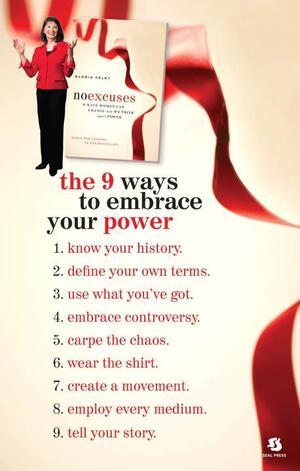Gloria Feldt's "No Excuses" says: "Know your history!"
No Excuses: 9 Ways Women Can Change How We Think About Power, by Gloria Feldt. For more info, visit www.GloriaFeldt.com
This month, Gloria Feldt's No Excuses: 9 Ways Women Can Change How We Think About Power hit book stores. A best-selling author, speaker and commentator on women, feminism, politics and leadership, Gloria Feldt is the former President of Planned Parenthood and currently on the Board of the Jewish Women's Archive.
No Excuses gets to the heart of the problem: Doors have been opened --many of them by the women featured in JWA's online exhibit, "Jewish Women and the Feminist Revolution" -- but not enough women are walking through them. Far from blaming women for being their own worst enemy, Gloria Feldt attacks the conventions that socialize men to ask for raises and women to let others speak first. I was impressed by the tone she sets from the beginning of the book, describing in the prologue that she has had her own struggles with power--her "personal power resistance demons."
It is reassuring to see that a woman like Gloria Feldt, someone I consider to be a powerful public figure, has had and will talk about these sorts of struggles. She tells us that, when people hear that she was recruited for the Planned Parenthood job, they are "incredulous at my claim that I didn't put myself forward."
I realize now that I sound as if I were a boat being carried by the current. To me, it felt I was just responding to what was needed of me rather than reaching for something I'd consciously sought to do. Only now am I coming to realize that women in general have been so invisible in society's halls of power for so long that we can hardly think of our own inchoate ambition as having instrinsic value; in fact, we've been cautioned that it could be dangerous to our love life to acknowledge such ambition publicly.
The book offers nine "power tools" women can use to break down and rebuild their relationship to power. In this post I'll talk about the first one: "Know your history and you can create the future of your choice."
Reading this chapter, I realized the difference this tool has made in my own life. While I may have been born a "Jewess with attitude," my journey to feminism and my fairly recent identification as a feminist only coalesced when I began working at the Jewish Women's Archive -- an organization dedicated to empowering Jewish women to know their history. Although I think I was always supportive of progessive values like equality and social justice, I never thought I was interested in "the Women's Movement." Naturally, such things weren't part of my high school curriculum, and I never even considered taking a Women's Studies course in college. So, joining the Jewish Women's Archive was a bit of a crash course in "knowing my history," and now that I do, well, it feels like I have a totally different frame of reference. My experience here has given me the contextural knowledge to "speak the language" and participate in the wider feminist conversation.
In this chapter, Glora Feldt outlines the history of the Women's Movement in America - starting with Abigail Adams. She identifies the way feminism has had "waves" and backlashes and addresses the current climate. Unlike most other feminists of her generation, Gloria Feldt recognizes the amazing work being done by women in their 20s--for example, Jessica Valenti of Feministing.com and Shelby Knox and the women of the Feminist Majority's Campus Leadership program (like our very own Emily Kadar!).
Gloria Feldt understands the difference between knowing our history and "living in the past." She is not lamenting the end of second-wave feminism with a sense of activist-nostalgia (as many others seem to do), but instead arguing that we use the past to guide us, empower us, and inform our choices for the future.
JWA embodies this message. The website is rich with stories of women -- from the past and the present -- who inspire me. JWA's outreach has had great success in integrating women's stories into the larger narrative of Jewish history in museums, classrooms, and on the street. And through this blog especially, we at JWA have been able to share stories and connect with others working for change now -- discussing history in the context of contemporary social justice and progressive change.
As Gloria Feldt writes:
... by learning about our past, we can once and for all overcome the invisible, almost primal, cultural barriers to women's equality. We can choose to break the old patterns within ourselves that hold us back, and we can make new ones.... We can create the future of our choice.
Will the other tools resonate with me as much? I suspect they will. You can visit Gloria Feldt's 9 Ways blog to discuss each of the tools. Today, the focus is #3, "How can you use what you’ve got to get what you want?" To learn more about the book, go to www.GloriaFeldt.com.







